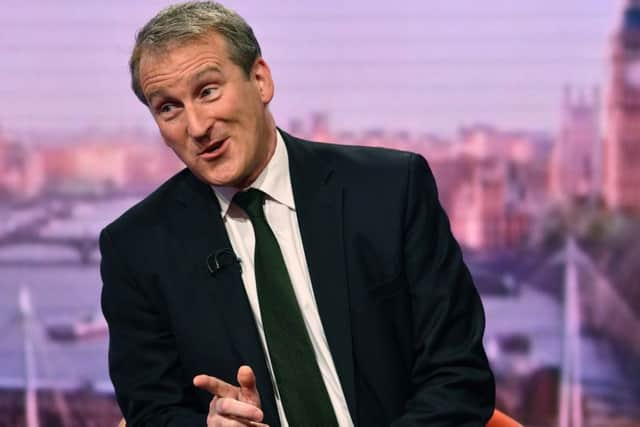Lesley Riddoch: Too late to stop Brexit Party bandwagon
Will there be a Tory campaign launch for the European elections? No, we don’t think that’s necessary. Will there be a manifesto? Well, we have lots of policies, I can explain them if you like.
Within the context of the Brexit quagmire, this may seem unremarkable. But there are basic conventions about elections and one is that political parties publish manifestos so voters know what they’re voting for. I can’t think of another election in which the governing party has failed to comply with this most fundamental part of the pact between politicians and voters. The most astonishing thing is that Theresa May thinks she’s got away with it, like a child hiding behind a book who thinks the rest of the world has disappeared. But politics doesn’t work that way, as the Conservatives are about to discover, courtesy of Nigel Farage.
Advertisement
Hide AdAdvertisement
Hide AdThe latest opinion polls suggest the Brexit Party is set to win the forthcoming Euro elections and could potentially become the largest party at any subsequent Westminster poll. 62 per cent of Tory members say they’ll back Farage along with 46 per cent of Tory councillors. Asked how she’d be voting by Radio 5 Live, Brexiteer Tory MP Maria Caulfield answered; “I don’t know.”


But actually, this is no different to the last European elections in 2014 when Nigel Farage unleashed his much-promised political earthquake. Ukip stormed to victory with 28 per cent of the vote and 23 MEPs, precipitating David Cameron’s promise of an EU referendum in the Tories’ 2015 manifesto. That general election saw Ukip come third in terms of the popular vote, but ended up with just one MP thanks to Westminster’s broken first-past-the-post system. The Tories’ 11.3m votes produced 329 seats – Ukip’s 3.9m votes produced just one seat. The Greens were similarly cheated. Even if you oppose Ukip’s politics, go figure how that can be called democracy.
Farage’s opponents heaved a sigh of relief. It might not have been the ideal way to defeat him, but any port in a storm. How wrong they were.
Voters may not have been storming the barricades demanding PR and the unelected House of Lords unaccountably produces less voter ire than the unelected European Commission – but let’s not misread the signs. Like referred pain in the human body, the hurt of Brexit relates to dysfunction elsewhere in the body politic. Broken British democracy is the problem and it feeds the Ukip/Brexit insurgency. Not being elected has actually suited Farage. It has let him play the martyr, evade political scrutiny during his fraudulent Brexit campaign, then slip away when the going got rough. Because his real, popular support was unacknowledged by British democracy, Farage was able to guilt-trip and browbeat broadcasters, becoming a near constant presence on opinion-forming news outlets. Above all, the unelectable Farage needed no manifesto. He just made it up as he went along. And now the Tory party, the government of this country, is playing the same low game.
Is it too late to stop the Brexit Party bandwagon? Yes, it is.
Farage ran amok on Question Time last week, speaking over every contributor and leaving the programme unwatchable for all but his supporters. Aunty retrieved itself somewhat yesterday when Andrew Marr gamely challenged Farage on his oft-overlooked far right policy stances which include replacing the NHS with a system of private health insurance. But that will hardly dent his support. Ukip has moved so far to the racist right that Farage looks almost respectable, and having Boris – the “lovable face of far right-wing lunacy” - as Tory leadership contender doesn’t hurt either. For voters who believe Brexit is the panacea for all Britain’s ills, there’s still only one game in town.
But the newness of his latest party vehicle shouldn’t disguise the fact Farage is still the old Farage. The added potency of the Brexit Party this time round derives from one simple fact. In the five years since his party won European elections but got no formal role within British politics, absolutely nothing has changed. The Tories still haven’t made their minds up about Brexit, neither has Labour. Britain is still the most centralised top-down society in Europe and in a quarter of seats it still doesn’t matter if you turn out and vote or not. From the Scottish perspective, the only change since 2014 is Holyrood’s imminent loss of devolved powers.
So, Farage is tactically right to bang on about democracy at every turn. Of course, he wouldn’t know it if democracy smacked him in the face and he doesn’t specify solutions beyond Brexit lest he accidentally refocus English voters on the real, immediate dangers of their own ailing, archaic system. But he’s absolutely on the money. It’s democracy, stupid - precisely because the main UK parties will not modernise the British state. The final straw is the Tory decision to flout electoral convention and pretend the European poll isn’t even happening.
Advertisement
Hide AdAdvertisement
Hide AdNigel is not the only insurgent new (old) kid on the block. The Lib Dems made a recovery at the local elections and, the Greens also did well. Indeed, all the parties with a clear vision of the future have picked up support. In Scotland, where the SNP has unequivocally nailed its colours to the European mast, it’ll be interesting to see if the recent declaration of a climate emergency by Nicola Sturgeon helps her or the Scottish Greens. The surprising decision by the hitherto Labour-supporting Sunday Mail to back Patrick Harvie’s party may be early evidence of a profound realignment, though some Yes supporters think it’s just a ruse to split the independence vote. The awkward truth could be that voters are more impatient for change than governing parties north and south of the border.
What a difference a month makes.